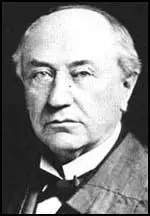David Brewer

David Brewer, the son of American missionaries, was born in Turkey on 20th June, 1837. The family returned to the United States in 1840 and Brewer was educated in Connecticut before attending Yale University.
Admitted to the bar in 1858, Brewer worked as a lawyer in Leavenworth before becoming a district judge in Kansas. Later he was a member of the Kansas Supreme Court (1870-84) and the federal circuit court (1884-89).
President Benjamin Harrison appointed him to the Supreme Court in 1889. A conservative he was particularly hostile to the emerging socialist movement. He criticised all plans to redistribute wealth and made many speeches in favour of inequality. In one speech in New York City in 1893 he argued: "It is the unvarying law that the wealth of a community will be in the hands of a few; and the greater the general wealth, the greater the individual accumulations. The large majority of men are unwilling to endure the long self-denial and saving which makes accumulation possible; they have not the business tact and sagacity which brings about large combinations and great financial results."
In 1894 the Pullman Palace Car Company reduced the wages of its workers. When the company refused arbitration, the American Railway Union called a strike. Starting in Chicago it spread to 27 states. The attorney-general, Richard Olney, sought an injunction under the Sherman Anti-Trust Act. As a result, of Olney's action, Eugene Debs, president of the American Railway Union, was arrested and despite being defended by Clarence Darrow, was imprisoned.
The case came before the Supreme Court in 1895. Brewer spoke for the court on 27th May, explaining why he refused the American Railway Union's appeal. "It is obvious that while it is not the province of the government to interfere in any mere matter of private controversy between individuals, or to use its great powers to enforce the rights of one against another, yet, whenever the wrongs complained of are such as affect the public at large, and are in respect of matters which by the Constitution are entrusted to the care of the nation, and concerning which the nation owes the duty to all the citizens of securing to them their common rights, then the mere fact that the government has no pecuniary interest in the controversy is not sufficient to exclude it from the courts or prevent it from taking measures therein to fully discharge those constitutional duties." This decision was a great set-back for the trade union movement.
David Brewer died on 28th March, 1910.
Primary Sources
(1) David Brewer, speech to the New York State Bar Association (January, 1893)
It is the unvarying law that the wealth of a community will be in the hands of a few; and the greater the general wealth, the greater the individual accumulations. The large majority of men are unwilling to endure the long self-denial and saving which makes accumulation possible; they have not the business tact and sagacity which brings about large combinations and great financial results; and hence it always has been, and until human nature is remodeled always will be, true that the wealth of a nation is in the hands of a few, while the many subsist upon the proceeds of their daily toil. But security is the chief end of government; and other things being equal, that government is best which protects to the fullest extent each individual, rich or poor, high or low, in the possession of his property and the pursuit of his business.
It was the boast of our ancestors in the Old Country that they were able to wrest from the power of the king so much security for life, liberty and property. Here, there is no monarch threatening trespass upon the individual. The danger is from the multitudes - the majority, with whom is the power. The common rule as to strikes is this: Not merely do the employees quit the employment, and thus handicap the employer in the use of his property, and perhaps in the discharge of duties which he owes to the public; but they also forcibly prevent others from taking their places.
(2) David Brewer, ruling of the Supreme Court on Eugene Debs and the Pullman Strike (27th May, 1895)
It is obvious that while it is not the province of the government to interfere in any mere matter of private controversy between individuals, or to use its great powers to enforce the rights of one against another, yet, whenever the wrongs complained of are such as affect the public at large, and are in respect of matters which by the Constitution are entrusted to the care of the nation, and concerning which the nation owes the duty to all the citizens of securing to them their common rights, then the mere fact that the government has no pecuniary interest in the controversy is not sufficient to exclude it from the courts or prevent it from taking measures therein to fully discharge those constitutional duties.
The national government, given by the Constitution power to regulate interstate commerce, has by express statute assumed jurisdiction over such commerce when carried upon railroads. It is charged, therefore, with the duty of keeping those highways of interstate commerce free from obstruction, for it has always been recognized as one of the powers and duties of a government to remove obstructions from the highways under its control.
